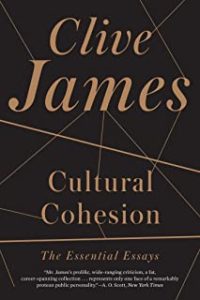Cultural Cohesion: The Essential Essays, Clive James 2013
If your idea of a delightful couple of hours is sitting with a good friend who is very well read, funny, deeply interested and informed about an extra-ordinary range of topics, and appears to be interested in what you know and think, then find a comfortable chair, pour yourself a cup of tea or a glass of single malt and open Cultural Cohesion to any random chapter. This collection, subtitled the Essential Essays, includes Clive James’ writings on poetry, fiction, cultural and literary criticism and film over the period of 1970 through the end of the century. James was an Aussie polymath who attended Cambridge and lived in England most of his life. He died late last year, leaving the world a much poorer place in criticism, erudition, and humor. This hefty volume of 619 pages kept me busy for weeks, dipping into it for escape during the COVID19 crisis and reading it for extended periods when I was able to concentrate on the fluid prose, the apt allusions, the encyclopedic knowledge of literature, and the sly, often laser-like laugh-out-loud humor. The book is divided into four sections: poetry, fiction and literature, culture and criticism and visual images, and each essay is followed by a ”postscript” in which James looks back and critiques his own essay from a vantage point of 10-30 years later. The poetry section, I must admit, was heavy going even for me, a lover of Erato’s inspirations, but his close reading of the texts and his detailed comments occasionally left me behind. Despite those challenges, the chapters on Auden, Heaney, Larken, Jarrell, and my favorite Stevie Smith (‘not waving, but drowning’) all enhanced my appreciation and understanding of those poets. James really shines in his analysis of fiction and its critics. Chapter after chapter enhanced my view of some of my favorite writers (Agee, Levi, Twain) or introduced me to new aspects of writers whom I’m not as familiar with (Lawrence, Solzenhitzyn, and James’ favorite role model, Edmund Wilson) including blistering commentary on Judith Krantz and the Sherlockologists. James may be at his best when he is in full choler attacking the small-mindedness of his least favorite writers and critics. The section on culture and criticism is superb and the chapter on the U. of Chicago’s Professor Wayne C. Booth’s structural criticism has both very funny lines and a deep explanation of the function of literary criticism. In reference to Booth’s systemitizing of poetic ‘modes’, James writes, “but to set about reconciling the systems themselves is like drawing up plans fora centralized world laundry.” He summarizes the function of literary criticism as being indispensable to civilization, not indispensable to art. Wonderful collection of essays from a writer who I already anticipate missing in the coming years.
As a rule, I rarely read supplemental material about an author or a book until I’ve finished writing my review and thus, seldom reference those sources in these reviews. In this case, however, I would call your attention to Dwight Garner’s Appraisal of James in the New York Times https://www.nytimes.com/2019/11/27/books/clive-james-appraisal.html?searchResultPosition=3. Garner provides some truly wonderful quotes including a couple of James’ best as he neared the end of his ten year experience with cancer. James said “The childish urge to understand everything doesn’t necessarily fade when the time approaches for you to do the most adult thing of all: vanish.” and “If you don’t know the exact moment when the lights will go out, you might as well read until they do.”



